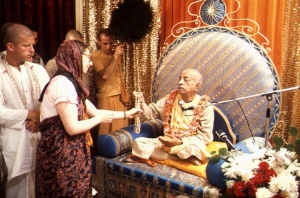CC Adi 12.37

A.C. Bhaktivedanta Swami Prabhupada
TEXT 37
- daṇḍa śuni’ ‘viśvāsa’ ha-ila parama duḥkhita
- śuniyā prabhura daṇḍa ācārya harṣita
SYNONYMS
daṇḍa — punishment; śuni’ — hearing; viśvāsa — Kamalākānta Viśvāsa; ha-ila — became; parama — very; duḥkhita — unhappy; śuniyā — hearing; prabhura — of Lord Caitanya Mahāprabhu; daṇḍa — punishment; ācārya — Śrī Advaita Ācārya Prabhu; harṣita — very pleased.
TRANSLATION
When Kamalākānta Viśvāsa heard about this punishment by Śrī Caitanya Mahāprabhu, he was very unhappy, but when Advaita Prabhu heard about it, He was greatly pleased.
PURPORT
In the Bhagavad-gītā (BG 9.29) the Lord says, samo ’haṁ sarva-bhūteṣu na me dveṣyo ’sti na priyaḥ: “I envy no one, nor am I partial to anyone. I am equal to all.” The Supreme Personality of Godhead being equal to everyone, no one can be His enemy, nor can anyone be His friend. Since everyone is a part or son of the Supreme Personality of Godhead, the Lord cannot be partial and regard someone as a friend and someone as an enemy. Thus when Lord Caitanya Mahāprabhu punished Kamalākānta Viśvāsa by no longer allowing him to come into His presence, although the punishment was actually very hard on him, Śrī Advaita Prabhu, understanding the inner meaning of such punishment, was happy because He appreciated that the Lord had actually favored Kamalākānta Viśvāsa. Therefore He was not at all unhappy. Devotees should always be happy with all the dealings of their master, the Supreme Personality of Godhead. A devotee may be put into difficulty or opulence, but he should accept both as gifts of the Supreme Personality of Godhead and jubilantly engage in the service of the Lord in all circumstances.